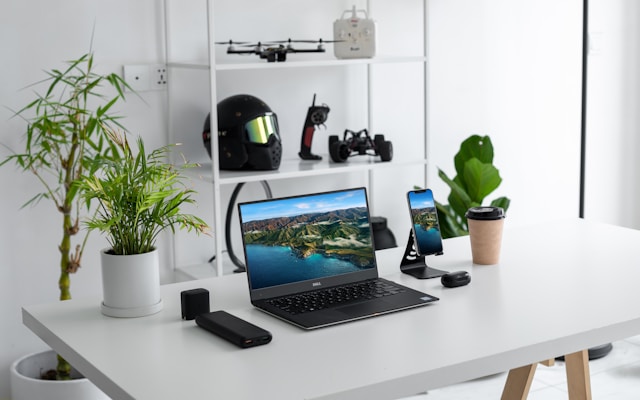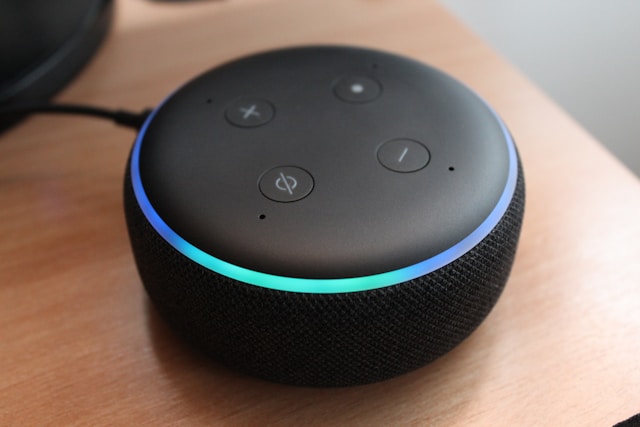Living with a disability, especially one that comes with age, can be a huge challenge. You’ll likely feel betrayed and a bit sad as you struggle to complete tasks you once were able to do with ease.
Luckily for you, however, we live in the modern age, and there are many adaptive technologies that can make your life easier and ensure you are able to enjoy the same things you have always enjoyed doing. So, no matter what disability you are struggling with, keep reading as we explain the best 8 adaptive technologies that will make your life easier.

1. Hands-Free Mouse
Computers are a necessity in the modern age, but if your hands are crippled from arthritis, you may find it difficult to use a mouse, type on a keyboard, and more. Purchasing a hands-free mouse can entirely turn your life around, as these devices allow you to control your computer using your movements, spoken words, and more—meaning you no longer need to use your hands to use a computer!
2. Wearable Cane
A wearable cane might sound strange, but it can completely change the life of someone with minor or progressive vision loss. This cane comes in the form of a brace, and it uses sensors to read your surroundings, providing audible feedback to the wearer. This ensures you will always be aware of a coming step, and you won’t walk into the wall.
While those who are fully blind will likely still need a cane or a seeing-eye dog, a wearable cane bridges the gap, lowering the likelihood of an accident for those who aren’t fully blind yet.
Related: What Are the Best Mobility Aids for Walking?
3. Watch With GPS
With the advent of smartwatches, there have been many new watches invented that can help those struggling with a variety of challenges as they age while still allowing them to live independently. Many of these watches have GPS tracking, and you can share the location with family and friends just in case you ever get lost.
Additionally, many smart watches also have the capability to make phone calls as long as you include them on your cellular plan—meaning if you fall and can’t get up, you can call for help right from your wristwatch.
AngelSense is a specific watch brand for seniors that has even more capabilities, such as setting a known route or area for walking and alerting a caregiver when the individual leaves the established radius. There is also a panic button, which can be set off by the wearer or caregiver to alert those in the area that there is someone there who needs help. AngelSense does require a subscription, but many users have reported it is well worth the cost.
4. Screen Reader
The OrCam is one of the best inventions in adaptive technology, and as such, it is quite costly. However, this device can totally transform how you live, so it is well worth the investment!
The OrCam is a camera that uses AI technology to read on your behalf and then speaks the words out loud. It can be used on physical or digital texts and responds to voice commands if you are looking for a specific portion of the text. You do have to be able to direct the camera in the right direction, so you still need a little bit of vision, though this gadget requires less vision than a simple text-to-speech scanner.
Related: The 10 Best Assistive Devices for Low Vision

5. Google Chromebook
As far as laptops go, the Google Chromebook is the most adaptive we’ve seen. With the ability to bend, shift, and even be used as just a tablet, it can fit well in your life no matter what you need it for. Type up an email on the traditional keyboard or swipe through a book on just the screen in tablet form—the options are endless!
Can’t get your finger to register on the screen? This can happen sometimes with age as the skin changes. Grab one of these conductive stylus’ to ensure you can use your new tablet!
6. Text-to-Speech Scanner
For those who still have some vision but not enough to read a book, a text-to-speech scanner can change your life. These scanners simply need to be run over the words, and then the device will read them and speak the words out loud. Allowing you to continue reading even if the words swim before your eyes.
It’s important to note, however, that this device will not help someone who is completely blind as the device does need to be run over the text sentence by sentence to read the words entirely. Additionally, this device only works for physical books and not digital text.
7. Tremor Utensils
If you or a loved one is suffering from Parkinson’s Disease, then you know how difficult mealtimes can be. Thanks to Gyenno’s utensils, that no longer needs to be the case as they have developed a utensil that reads and adapts to any tremors, allowing the user to feed themselves with confidence.
Plus, the company behind this device is devoted to learning, and your one-time purchase comes with a lifetime of updates that they activate regularly. With both a fork and spoon head, which can be detached for washing, this utensil is a must-have for anyone who struggles with keeping their hands steady!
8. Audible Subscription
Those who love to read can continue their love of reading even if they are experiencing full vision loss. An audible subscription is easy to have a family member set up and then can be used to download a set number of books each month. All these books are audiobooks, so you can play and listen to them with ease (with Siri or Alexa).
Additionally, you can access a variety of additional podcasts for free, allowing you to listen to a wide variety of concepts and learn about new things! You can also gift an audible subscription if you are looking to treat a friend for their birthday or an upcoming holiday!
Overall, we hope this list has helped you to find some adaptive technologies that will change your (or a family members life!)
You May Also Enjoy: How to Approach the Topic of Adaptive Clothing



















Comments are closed.